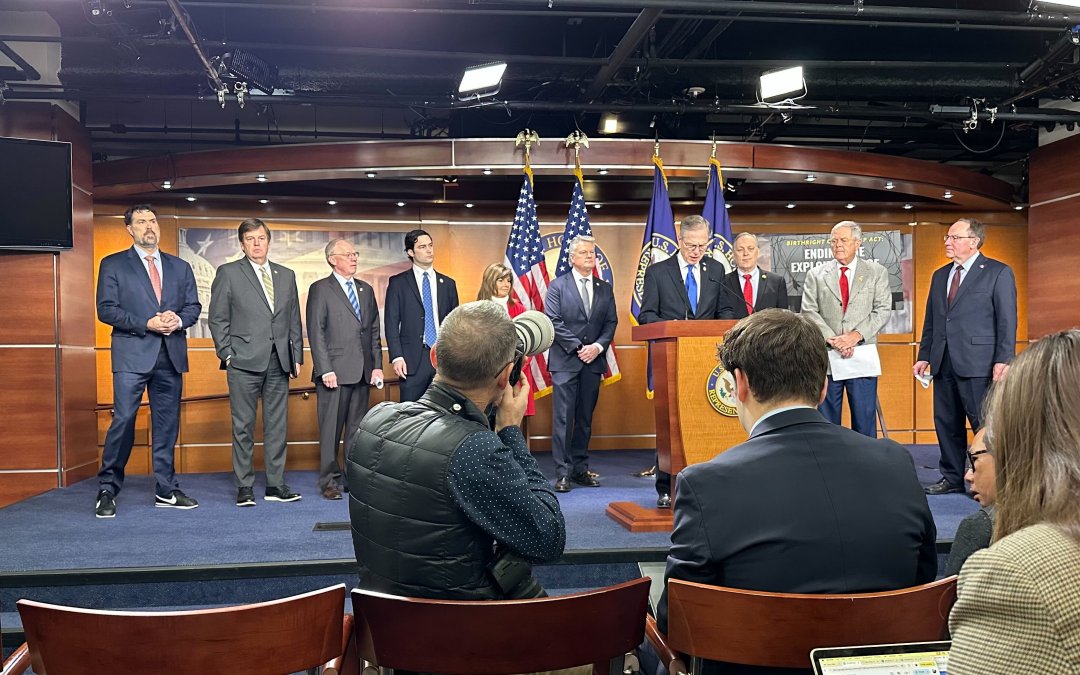WASHINGTON – In a press-filled Oval Office Monday night President Donald Trump signed a string of executive orders that included a declaration that U.S.-born children whose parents do not have permanent legal status will no longer be considered citizens. The order attempts to eliminate birthright citizenship guaranteed under the 14th Amendment.
More than twenty states, as well as San Francisco and Washington, D.C., immediately filed lawsuits in federal district courts to stop the order. On Thursday, a federal court temporarily blocked Trump’s order, pausing its implementation until it can be further reviewed.
Undeterred, Representative Brian Babin (R-Tex.) followed the executive order’s release by introducing The Birthright Citizenship Act of 2025. In a press conference Thursday, Rep. Babin explained that he proposed this bill with the goal of “ensuring citizenship, a cornerstone of our national identity, is protected, respected and aligned with the principles upon which this country was built.”
The recent legal action to end birthright citizenship reflects the larger sentiment by Republicans that the 14th Amendment, specifically the Citizenship Clause, requires reinterpretation in the current political climate.
Originally proposed to extend citizenship to formerly enslaved people in 1868, the Citizenship Clause of the 14th Amendment states that “all persons born or naturalized in the United States, and subject to the jurisdiction thereof, are citizens of the United States.”
Hector Sánchez Barba, the president and CEO of Mí Familia Vota, a non-profit organization working to increase political participation in Latino communities, said he’s worried about the consequences this will have on immigrant communities.
“Trump’s proposed executive orders mark a return to a type of hate and harm that promotes inhumane and unconstitutional policies targeting Latinos and immigrants in particular,” he said.
However “people don’t need to panic yet,” said Jayesh Rathod, Professor of Law and Director of the Immigrant Justice Clinic at American University Washington College of Law.
Birthright citizenship as a condition of the legal status of one’s parents dates back to the 1898 Supreme Court case United States v. Wong Kim Ark.
Wong Kim Ark was born in San Francisco to Chinese-born parents during the time of the Chinese Exclusion Act, a policy denying citizenship to Chinese immigrants. The court answered the question of whether the 14th Amendment applied to a child born in the United States to Chinese-citizen parents. A 6-2 majority ruling applied the principle of jus soli, Latin for “right of soil”, that extends citizenship to children born in the U.S. to non-citizens.
Wong Kim Ark’s parents had legal permanent residency in the United States. Republicans argue that the scope of this decision does not extend to children born to parents who do not have permanent legal status.
“People who are using this [argument] now, they’re here temporarily and they’re here illegally,” said Rep. Andy Biggs (R-Ariz.) on Thursday.
However, these actions do not rewrite the Constitution. Amendments to the Constitution require a supermajority vote in Congress and ratification by three-quarters of the states.
“We’re not asking for the Constitution to be changed,” said Rep. Rose (R-Tenn.) Thursday in reference to the bill. “We’re just asking for it to be applied and interpreted as it was intended and as it was read.”
Rathod said Trump’s executive order was designed to create a snowball effect of legal battles that would end up at the Supreme Court and provide a chance to reinterpret the Wong Kim Ark ruling.
Rathod also said that the executive order lacks justification as to why birthright citizenship should be ended.
“It doesn’t actually get into a deeper moral or even political or economic justification,” Rathod said. “I think that it’s important as a society that we think about those bigger picture questions too.”
The coming months will almost certainly bring additional lawsuits and proposed legislation from Congress, according to Rathod. However, advocacy groups like Mí Familia Vota hope for solutions that support immigrant communities across the country.
“Eleven million undocumented people in the most powerful nation in the world is not a mistake,” said Sánchez Barba. “It’s time for permanent solutions that promote justice, dignity and respect.”

